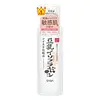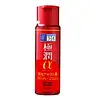What's inside
What's inside
 Key Ingredients
Key Ingredients

 Benefits
Benefits

 Concerns
Concerns

 Ingredients Side-by-side
Ingredients Side-by-side

Water
Skin ConditioningButylene Glycol
HumectantDipropylene Glycol
HumectantDiglycerin
HumectantMethyl Gluceth-20
HumectantBetaine
HumectantSoymilk Isoflavones
AntioxidantMilk Ferment
Skin ConditioningCeramide Ng
Skin ConditioningDipotassium Glycyrrhizate
HumectantArginine
MaskingCarbomer
Emulsion StabilisingXanthan Gum
EmulsifyingCitric Acid
BufferingSodium Citrate
BufferingCyclodextrin
AbsorbentPhytosterols
Skin ConditioningSodium Polyacrylate
AbsorbentPolyquaternium-51
Skin ConditioningMethyl Gluceth-10
EmulsifyingSucrose Laurate
EmollientPotassium Hydroxide
BufferingHydrogenated Lecithin
EmulsifyingPhenoxyethanol
PreservativeMethylparaben
PreservativeWater, Butylene Glycol, Dipropylene Glycol, Diglycerin, Methyl Gluceth-20, Betaine, Soymilk Isoflavones, Milk Ferment, Ceramide Ng, Dipotassium Glycyrrhizate, Arginine, Carbomer, Xanthan Gum, Citric Acid, Sodium Citrate, Cyclodextrin, Phytosterols, Sodium Polyacrylate, Polyquaternium-51, Methyl Gluceth-10, Sucrose Laurate, Potassium Hydroxide, Hydrogenated Lecithin, Phenoxyethanol, Methylparaben
Water
Skin ConditioningButylene Glycol
HumectantGlycerin
HumectantHyaluronic Acid/Polyglutamic Acid Crosspolymer
AntioxidantSodium Hyaluronate
HumectantHydrolyzed Hyaluronic Acid
HumectantHydrolyzed Elastin
EmollientTetrapeptide-5
Skin ConditioningHydrolyzed Collagen
EmollientLactobacillus
Skin ConditioningPhytosteryl Macadamiate
Skin ConditioningPhytosteryl/Octyldodecyl Lauroyl Glutamate
Skin ConditioningSqualane
EmollientDiglycerin
HumectantPullulan
Limnanthes Alba Seed Oil
Skin ConditioningPentylene Glycol
Skin ConditioningPolyquaternium-51
Skin ConditioningIsohexadecane
EmollientXanthan Gum
EmulsifyingCarbomer
Emulsion StabilisingCaprylic/Capric Triglyceride
MaskingPPG-10 Methyl Glucose Ether
Skin ConditioningPolyacrylate Crosspolymer-11
Emulsion StabilisingHydroxyethyl Acrylate/Methoxyethyl Acrylate Copolymer
Polysorbate 60
EmulsifyingAmmonium Acrylates Copolymer
PEG-20 Sorbitan Isostearate
EmulsifyingMelaleuca Alternifolia Leaf Oil
AntioxidantDisodium EDTA
Methylparaben
PreservativeWater, Butylene Glycol, Glycerin, Hyaluronic Acid/Polyglutamic Acid Crosspolymer, Sodium Hyaluronate, Hydrolyzed Hyaluronic Acid, Hydrolyzed Elastin, Tetrapeptide-5, Hydrolyzed Collagen, Lactobacillus, Phytosteryl Macadamiate, Phytosteryl/Octyldodecyl Lauroyl Glutamate, Squalane, Diglycerin, Pullulan, Limnanthes Alba Seed Oil, Pentylene Glycol, Polyquaternium-51, Isohexadecane, Xanthan Gum, Carbomer, Caprylic/Capric Triglyceride, PPG-10 Methyl Glucose Ether, Polyacrylate Crosspolymer-11, Hydroxyethyl Acrylate/Methoxyethyl Acrylate Copolymer, Polysorbate 60, Ammonium Acrylates Copolymer, PEG-20 Sorbitan Isostearate, Melaleuca Alternifolia Leaf Oil, Disodium EDTA, Methylparaben
Ingredients Explained
These ingredients are found in both products.
Ingredients higher up in an ingredient list are typically present in a larger amount.
Butylene Glycol (or BG) is used within cosmetic products for a few different reasons:
Overall, Butylene Glycol is a safe and well-rounded ingredient that works well with other ingredients.
Though this ingredient works well with most skin types, some people with sensitive skin may experience a reaction such as allergic rashes, closed comedones, or itchiness.
Learn more about Butylene GlycolCarbomer is a polymer of acrylic acid. Its main role is to create a gel consistency.
A high amount of carbomer can cause pilling or balling up of products. Don't worry, most products contain 1% or less of carbomer.
Diglycerin is a humectant. It is derived from glycerin, which is naturally found in your skin.
As a humectant, it helps draw moisture to the skin from the air.
Methylparaben is a preservative and is a paraben. It is used to prevent the growth of fungus, mold, and other harmful bacteria. Parabens are chemicals used as preservatives in both cosmetics and food.
Methylparaben can be synthetically created. It can also be found naturally in some fruits, such as blueberries.
Oftentimes, Methylparaben is combined with other parabens to help increase the shelf life.
The safety of Methylparaben is currently being studied. While ongoing studies are looking into the safety of parabens, the results have been very mixed. Some studies have not found Methylparaben to be harmful.
Learn more about MethylparabenPolyquaternium-51 is a polymer salt. It helps hydrate the skin by creating a film on top. This film traps moisture in, keeping your skin soft and hydrated.
Water. It's the most common cosmetic ingredient of all. You'll usually see it at the top of ingredient lists, meaning that it makes up the largest part of the product.
So why is it so popular? Water most often acts as a solvent - this means that it helps dissolve other ingredients into the formulation.
You'll also recognize water as that liquid we all need to stay alive. If you see this, drink a glass of water. Stay hydrated!
Learn more about WaterXanthan gum is used as a stabilizer and thickener within cosmetic products. It helps give products a sticky, thick feeling - preventing them from being too runny.
On the technical side of things, xanthan gum is a polysaccharide - a combination consisting of multiple sugar molecules bonded together.
Xanthan gum is a pretty common and great ingredient. It is a natural, non-toxic, non-irritating ingredient that is also commonly used in food products.
Learn more about Xanthan Gum